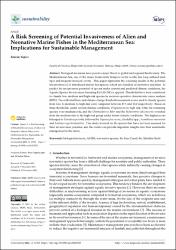A risk screening of potential invasiveness of alien and Neonative marine fishes in the mediterranean sea: Implications for sustainable management
Künye
Yapici, S. A Risk Screening of Potential Invasiveness of Alien and Neonative Marine Fishes in the Mediterranean Sea: Implications for Sustainable Management. Sustainability 2021, 13, 13765. https://doi.org/10.3390/su132413765Özet
Biological invasions have posed a major threat to global and regional biodiversity. The Mediterranean Sea, one of the major biodiversity hotspots in the world, has long suffered multiple and frequent invasion events. This paper represents the screening results of the potential invasiveness of 23 introduced marine fish species, which are classified as neonative and alien. To predict the invasiveness potential of species under current and predicted climate conditions, the Aquatic Species Invasiveness Screening Kit (AS-ISK) is applied. Thresholds have been constituted to classify low, medium and high-risk species by receiver operative characteristic curve analysis (ROC). The calibrated basic and climate-change threshold assessment scores used to classify species from low, to medium to high risk were computed between 27.5 and 33.0 respectively. Based on these thresholds, under current climatic conditions, 15 species were high risk, while the remaining species were medium risk, and the Chaetodipterus faber and the Holocentrus adscensionis switched from the medium-risk to the high-risk group under future climatic conditions. The highest score belonged to Fistularia petimba, followed by Siganus fuscescens, Abudefduf spp., Acanthurus monroviae and Lutjanus argentimaculatus. This study focused on the species that have not been assessed for their invasiveness potential, and the results can provide important insights into their sustainable management in the future. © 2021 by the authors. Licensee MDPI, Basel, Switzerland.


















